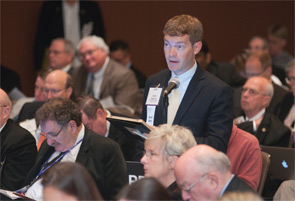
Every June, physicians in every specialty from across the country meet in Chicago at the American Medical Association (AMA) House of Delegates (HOD) meeting to debate policy. The process is quite complex but, as a delegate, I feel privileged to be part of it and to vote on behalf of rheumatologists across the nation. I am joined each year by Eileen Moynihan, MD, the alternate delegate, and Colin Edgerton, MD, the delegate from the Young Physician Section. This year, many issues were discussed that could have an effect on rheumatologists.
As the ACR’s delegateces, Drs. Moynihan, Edgerton, and I take part in a review of the year’s new resolutions and meet with ACR committees before the meeting to discuss how the ACR should vote. Once we arrive at the HOD meeting, we vote to support or oppose a variety of resolutions and work to build relationships with other societies. Here is a brief overview of some of the issues that were covered during the June 2012 meeting.
- Value-Based Insurance Design: The AMA will conduct a study to evaluate the utility of value-based insurance design as a modality for enhancing patient care and reducing healthcare costs. One of the AMA councils will research and develop a position on value-based insurance design that will be reviewed at a future meeting.
- Sign-Language Interpreter Reimbursement: Several years ago, a rheumatologist lost $450,000 in a lawsuit when he did not provide a sign-language interpreter for a patient. To mitigate this risk, a resolution was introduced asking the AMA to seek legislation to require health insurers to reimburse healthcare providers for the cost of providing sign-language interpreters for hearing-impaired patients in their care.
- Value-Based Payment Modifier: The current AMA policy H.390.849 was reaffirmed at this meeting. The policy supports payment methodologies that redistribute Medicare payments among providers based on outcomes, quality, and risk-adjustment measures only if these measures are scientifically valid, verifiable, accurate, and based on current data. The reaffirmation of this policy serves as an important reminder to the Centers for Medicare and Medicaid Services (CMS) as they prepare to issue their first Quality Resource Use Reports in four states. These reports will compare individual physicians’ quality and costs measures with other doctors treating Medicare patients. The ACR has been assessing these quality reports and will meet directly with CMS to discuss the system’s shortfalls for rheumatologists.
- Medicare Records Retention and Overpayment Recoupment: This resolution requested that the AMA vicariously object to the U.S. Department of Health and Human Services (HHS) collecting overpayments of Medicare services within 60 days of discovery regardless of how it would affect the cash flow and the solvency of the medical practice. Additionally, HHS wanted to be able to audit within 10 years of the date the funds were received instead of the current six-year requirement. The resolution was adopted, and now the AMA will actively work to overturn these burdensome regulations. The ACR is proud to have been part of this decision to pursue the policy reversal, and it is also working directly with HHS on this issue.
- Evaluation of ICD-11 as New Diagnostic Coding System: A new AMA policy adopted in June directs one of its councils to conduct a feasibility study of moving directly to ICD-11 instead of moving to ICD-10 in 2014, followed by a move to ICD-11 a few years later. The ACR supports this study and wrote a comment letter to CMS requesting that they conduct a similar feasibility study.
- Maintenance of Certification: Last year, the ACR submitted Resolution 322 to request that the AMA investigate the impact of continuing education on the workforce. As a result of this resolution, the AMA assigned the research to its Council on Medical Education. This June, the council’s report, “Impact of Maintenance of Certification, Osteopathic Continuous Certification, and Maintenance of Licensure on the Physician Workforce,” was submitted for review. The AMA House of Delegates approved the report’s recommendations that Maintenance of Certification (MOC) and Maintenance of Licensure (MOL) requirements should not reduce the capacity of the overall physician workforce. The HOD is now actively working with the American Board of Medical Specialties, the American Osteopathic Association, and the Federation of State Medical Boards to make both MOC and MOL processes “more accessible and meaningful to physicians and decrease the bureaucratic burden.”1
- Drug Shortages: We have experienced many drug shortages for rheumatic drugs during the last few years, and the ACR has written letters and had discussions with members of Congress about this issue. The HOD approved a resolution to support the requirement of all manufacturers of Food and Drug Administration–approved drugs to give the agency advance notice, within six months, of anticipated drug shortages. The AMA also supports the authorization of the secretary of HHS to expedite facility inspections and the review of manufacturing changes, drug applications, and supplements to help prevent drug shortages.
- Ultrasound: The AMA affirmed that ultrasound imaging is a safe, effective, and efficient tool when utilized by appropriately trained physicians. Additionally, the AMA supports the educational efforts and widespread integration of ultrasound throughout the continuum of medical education.
This is just a small sample of the issues discussed at the meeting in June. There are many issues that affect areas like public health, imaging, and pain. A full review of the meeting and all the reports and resolutions are available on the AMA website. The important thing to remember is that, while all of these issues were being discussed, rheumatology had a voice. We had the ability to build coalitions, make amendments, and to support or oppose resolutions.


